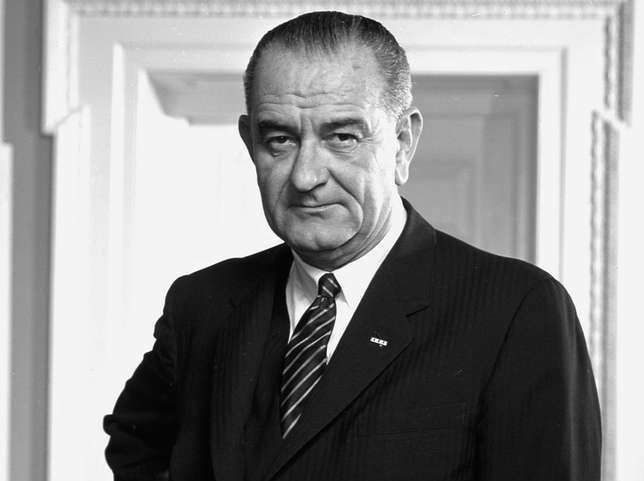REVIEW POTPOURRI: Lyndon B. Johnson
 by Peter Cates
by Peter Cates
Lyndon B. Johnson
The 36th President Lyndon Baines Johnson (1908-1973) was, for good and bad, one formidable leader during his five years at 1600 Pennsylvania Avenue.
During October/November 1960, I vividly remember the two individuals and their running mates in the battle for the White House – Republicans Richard Nixon (1913-1994) and Massachusetts Senator/UN Ambassador Henry Cabot Lodge Jr. (1902-1985) versus Kennedy and Johnson. Every East Vassalboro school day in Susan Brondmo’s fourth grade classroom, I was bringing clippings of political cartoons from the Waterville Morning Sentinel for the morning current news show and tell; I may have monopolized the board on the wall with my offerings.
Anyways, the Cates tribe had been Republicans for decades, so I never shirked my loyalism.
Meanwhile, Uncle Charlie Rodis, who had married into the family the previous July, grew up in a Greek-American family of Democrats, in Portland; for reasons known only to God, he had never discussed politics and encountered stone cold silence at the Thanksgiving dinner when expressing jubilation about the new president.
To my little boy’s sensibilities, Nixon, despite his uncouth five o’clock shadow, and the pleasantly smiling, consummate gentleman Lodge epitomized true honesty and integrity while seemingly forthright but not quite trustworthy, Kennedy struck me the wrong way; Johnson came off as a smiling gross pig. Thus, I concluded that adults would use common sense and vote Republican.
Nixon won by a very narrow lead, so we thought; within 24 hours, Chicago Mayor Richard Daly’s Cook County machine swung the victory to Kennedy.
On November 22, 1963, aboard Air Force One, Johnson was sworn in as president with grief-stricken widow Jackie Kennedy at his side and he exuded the finest nobility and serious demeanor in his photo. I now trusted him.
Buildings of books, magazines and other documents chronicle Johnson’s legacy. He did sincerely wage war on poverty with his Great Society and shepherded the 1965 Civil Rights Bill.
Johnson also escalated and prolonged the horribly bloody Vietnam War , a conflict that still divides people very sadly (I am personally pleading the Fifth on whether it was worth it).
A very worthy reading experience is The Tragedy of Lyndon Johnson by Princeton professor and historian Eric Goldman (1916-1989) who served from 1963 to 1966 as a special advisor to the president.
At first their working relationship was congenial, although Goldman was never part of the inner circle. Only later when the controversies increasingly swirling around Johnson and a lack of understanding by Goldman as to what was expected of him ended his work at the White House. The book was published in 1969.
Also worth dipping into is the multi-volume, still unfinished biography of Johnson by Robert Caro.
Responsible journalism is hard work!
It is also expensive!
If you enjoy reading The Town Line and the good news we bring you each week, would you consider a donation to help us continue the work we’re doing?
The Town Line is a 501(c)(3) nonprofit private foundation, and all donations are tax deductible under the Internal Revenue Service code.
To help, please visit our online donation page or mail a check payable to The Town Line, PO Box 89, South China, ME 04358. Your contribution is appreciated!



Leave a Reply
Want to join the discussion?Feel free to contribute!